“The Big Short” made Michael Burry one of the market’s most famous bears. But he seems to have warmed to stocks last quarter, three portfolio gurus told Business Insider.
The investor’s Scion Asset Management swapped out bearish put options on six stocks for bullish call options on nine stocks last quarter, its portfolio update from last week shows. The notional values of those positions were $186 million and $522 million, respectively.
At the end of March, Burry’s hedge fund held seven positions, including puts on Alibaba, JD.com, and Nvidia, plus a direct stake in Estée Lauder, per its first-quarter portfolio update. Three months later, it held 15 positions, including calls and direct stakes in Estée Lauder and Lululemon, and calls on Alibaba, JD.com, and VF.
While these filings only capture a snapshot of Burry’s US stock holdings on a single day and are published with a six-week delay, they may provide some insights into his investing strategy and market outlook.
Burry bet against China-exposed tech stocks in Q1, but pivoted in Q2
Burry’s first-quarter portfolio suggests he was confident that tech stocks, especially in China, would “suffer considerably going forward,” Peter Mallouk, the president and CEO of Creative Planning, told Business Insider.
“He clearly thought these stocks are overvalued and was expecting a correction — at least — in this group,” he added. All of the stocks Burry bet against except Nvidia declined last quarter.
Burry’s revamped positions at the end of June “signal a very different take,” Mallouk said, adding that the calls and long bets are “substantive” and indicate he’s “expecting the run up to continue.”
“He has gone from a strong conviction bet on a sector fall to a broad-based bet the bull run will continue,” Mallouk said. The benchmark S&P 500 index has surged more than 28% from its April low, and more than 3% since the end of June, to record highs of above 6,400 points.
Burry didn’t respond to a request for comment from Business Insider.
Gerry Fowler, the head of equity derivatives at UBS, said that Burry seems to have swung from “modest bearishness to cautious bullishness.”
Burry’s portfolio appears “opportunistic” and “contrarian,” Fowler added, as he switched his short bets on China-exposed stocks such as Alibaba and JD.com to long wagers on those same names plus others that tanked in April.
Fowler added that the size of Burry’s long positions suggests he’s not relying heavily on debt to finance them, and his call options “reflect some concern for downside risks still,” because using options means tying up less capital and putting less money at risk than if he bought the underlying stocks.
Burry appears to have bet on several embattled companies to stage comebacks, Daniel Bustamante, the chief investor of Bustamante Capital Management and founder of “The LongVol Report,” told Business Insider.
The fund manager said Estée Lauder and VF, the owner of The North Face, are “genuine turnaround plays” as the beauty giant’s new CEO is working to cut costs and revitalize weak China sales, while the new bosses of VF are trying to revive its street-fashion brand Vans and cut costs too.
Bustamante said he felt less positive about Burry’s bullish position on athleisure brand Lululemon, which recently lost its chief product officer, Sun Choe, to VF.
“Losing her is the equivalent to losing Steph Curry to another team,” Bustamante said. The stock has tumbled nearly 50% this year as investors have balked at slowing growth, fierce competition, and tariffs raising its costs.
Burry’s use of options could result in a bigger payout
By using options, Burry is “playing it in the right manner both from a risk perspective and potential return view,” Bustamante said, as he stands to pocket an “asymmetric payout” if any of the ailing businesses do bounce back.
Burry’s iconic “Big Short” against the mid-2000s housing bubble was also asymmetric. He purchased credit-default swaps that acted as insurance against a housing crash, paid only modest premiums to hold them, then reaped huge profits when widespread mortgage defaults triggered payouts from the derivatives.



